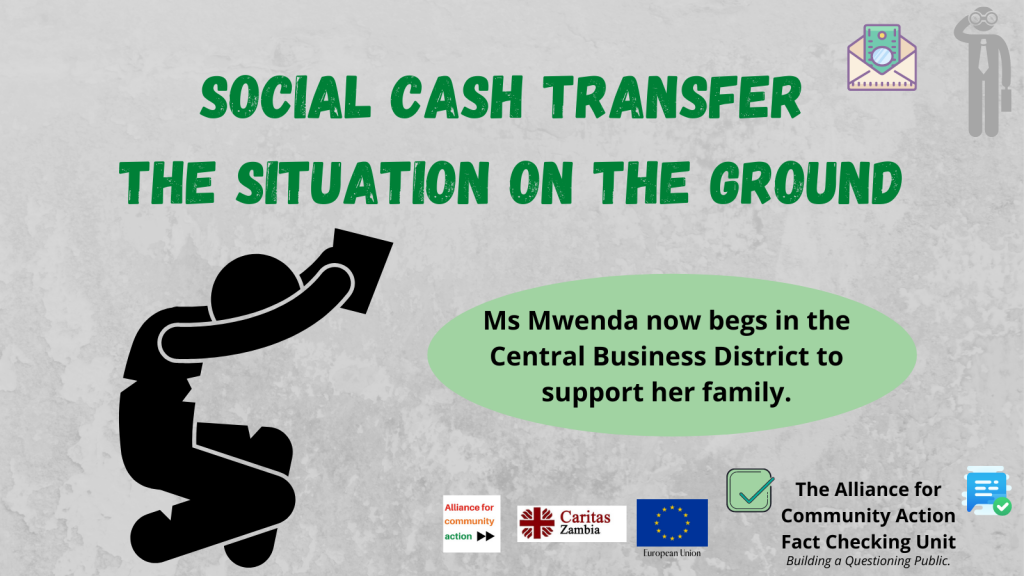
Introduction
On Saturday 10th October 2020, President Edgar Lungu posted the following statement on his official Facebook page:
“Social cash transfer, food security packs, emergency cash transfer scheme, and supporting women livelihood programmes are some of the avenues in which government is able to respond to the needs of the most vulnerable people in society with 4.2 million Beneficiaries across so far.“
The Alliance for Community Action Fact-checking Unit is in this investigation seeking to determine how the social cash transfer facility has performed.
Process
Documents Review
The 2018 Auditor General report was reviewed for its findings on the use of social cash transfer funds.
Case Study – Livingstone
The Alliance for Community Action Fact Checking Unit, in cooperation with Mosi O Tunya Radio Station, visited the District community Development Office to find out when the cash transfer was last distributed.
The fact-checking team then identified social cash transfer beneficiaries to determine what the effects of the suspension of the Social Cash Transfer had had on them especially during the Coronavirus Pandemic.
Findings
- Auditor General’s Report
A review of the 2018 Auditor General’s Report shows that the Zambia Postal Services (ZAMPOST), engaged by the Ministry of Community Development, on a pilot three (3) year renewable contract, to manage payment of Social Cash Transfer funds to Luapula and Western Provinces, did not pay the Social Cash Transfer beneficiaries funds amounting to K30 million. These funds were not accounted for with no evidence of the resources having been banked and no cash found on hand. - Ministry of Community Development Information
The Livingstone Community Development office informed the fact-checking team that beneficiaries in Livingstone last received the Social Cash Transfer in December 2018. The District Office could not, however, give reasons as to why the social cash transfer has been regularly administered and referred questions to Choma or Lusaka.
The team was further informed that there are 2,157 current beneficiaries of Social Cash Transfer in Livingstone as follows:
• 984 disabled beneficiaries – 462 Female and 522 Males each receiving k360 bi-monthly.
• 1173 able-bodied recipients – 728 females and 445 males each receiving K180 bi-monthly
In 2018, 2,000 more people were to be included on the program in the district but these are still awaiting approval. In 2020, 1,107 more are scheduled to be included on the program. - Effects of Suspension of Social Cash Transfer
The ACA Fact-checking Unit interviewed 33 Social Cash Transfer beneficiaries. Below is a sample of how they described the effects of the failure to receive social cash transfers:
78-year Henry has started crushing stones to support his family.
Sibeso takes care of orphaned grandchildren. The visually impaired and widow says the absence of the social cash transfer has not only made it difficult to feed her family but affected the education of two of her grandchildren for whom she has been unable to pay fees schools leading to them attending class inconsistently.
Ms Mwenda now begs in the Central Business District to support her family.
Mr Zulu who has a physical disability and lives with 3 of his 8 children. The 3 are regularly sent away from school due to non-payment of user fees. He is a tailor who says his business is very slow.
91 years old Mutaipi receives K180 bi-monthly and says this is his only income. He supports a granddaughter. At the time of speaking to the fact-checking team, he said the two of them had gone 3 days without a proper meal.
Malumo and her husband, Mite, live with their 4-year old son in Livingstone’s Sakubita Compound. The couple both receive social cash transfer due to ill health. The suspension of the social cash transfer has resulted in their failure to access medication. To survive, the couple fetches water for community members at a fee.
Belita Lives with her 2 daughters and 2 grandchildren. She is the breadwinner in the family who now fetches firewood for sale since she stopped receiving the social cash transfer. A bunch of firewood at fetches k5. This livelihood is also under threat as she has been visited by officers from the Department of National Parks and Wildlife reportedly who have cautioned her to stop told her illegal collection of firewood in the game park. She has called on Government to step in and administer the Social Cash Transfer.
Mr Stainly reports a battle to feed himself without the social cash transfer. He has been laid off the security job that used to supplement the fund due to COVID.
Overall, the beneficiaries of the social cash transfer expressed a desperation for the disbursement to resume. The district Office could not state when this will be.
Conclusion
It is the conclusion of this investigation that beneficiaries of the social cash transfer are very dependent on the money they receive. The FactCheck further finds that beneficiaries who are currently not accessing the funds are facing destitution. Our finding is that the unaccountable management of the fund, as reported in the Auditor General’s Report, worsens hardship among the beneficiaries who depend on the fund.
The ACA Fact-checking Unit is part of the European Union in Zambia ‘Ask Project’. This FactCheck was carried out in cooperation with Mosi-o-Tunya Radio Station in Livingstone.